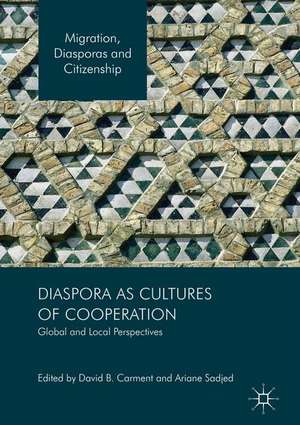Diaspora as Cultures of Cooperation: Global and Local Perspectives: Migration, Diasporas and Citizenship
Editat de David Carment, Ariane Sadjeden Limba Engleză Hardback – feb 2017
This book examines the dynamic processes by which communities establish distinct notions of 'home' and 'belonging'. Focusing on the agency of diasporic groups, rather than (forced or voluntary) dispersion and a continued longing for the country of origin, it analyses how a diaspora presence impacts relations between 'home' and host countries. Its central concern is the specific role that diasporas play in global cooperation, including cases without a successful outcome. Bridging the divide between diaspora studies and international relations, it will appeal to sociologists, scholars of migration, anthropologists and policy-makers.
| Toate formatele și edițiile | Preț | Express |
|---|---|---|
| Paperback (1) | 641.20 lei 43-57 zile | |
| Springer International Publishing – 12 iul 2018 | 641.20 lei 43-57 zile | |
| Hardback (1) | 644.18 lei 43-57 zile | |
| Springer International Publishing – feb 2017 | 644.18 lei 43-57 zile |
Din seria Migration, Diasporas and Citizenship
-
 Preț: 390.63 lei
Preț: 390.63 lei -
 Preț: 397.59 lei
Preț: 397.59 lei - 15%
 Preț: 584.58 lei
Preț: 584.58 lei -
 Preț: 417.90 lei
Preț: 417.90 lei -
 Preț: 390.63 lei
Preț: 390.63 lei -
 Preț: 388.72 lei
Preț: 388.72 lei - 18%
 Preț: 786.84 lei
Preț: 786.84 lei -
 Preț: 419.81 lei
Preț: 419.81 lei -
 Preț: 392.60 lei
Preț: 392.60 lei - 15%
 Preț: 593.08 lei
Preț: 593.08 lei -
 Preț: 386.81 lei
Preț: 386.81 lei -
 Preț: 381.21 lei
Preț: 381.21 lei -
 Preț: 391.61 lei
Preț: 391.61 lei - 15%
 Preț: 640.88 lei
Preț: 640.88 lei - 15%
 Preț: 585.40 lei
Preț: 585.40 lei - 18%
 Preț: 784.79 lei
Preț: 784.79 lei - 15%
 Preț: 641.38 lei
Preț: 641.38 lei - 18%
 Preț: 726.37 lei
Preț: 726.37 lei -
 Preț: 488.51 lei
Preț: 488.51 lei -
 Preț: 270.19 lei
Preț: 270.19 lei -
 Preț: 381.21 lei
Preț: 381.21 lei -
 Preț: 394.51 lei
Preț: 394.51 lei -
 Preț: 387.38 lei
Preț: 387.38 lei -
 Preț: 388.72 lei
Preț: 388.72 lei -
 Preț: 391.61 lei
Preț: 391.61 lei - 18%
 Preț: 789.35 lei
Preț: 789.35 lei -
 Preț: 391.02 lei
Preț: 391.02 lei -
 Preț: 389.31 lei
Preț: 389.31 lei - 15%
 Preț: 502.04 lei
Preț: 502.04 lei - 15%
 Preț: 700.42 lei
Preț: 700.42 lei - 15%
 Preț: 699.77 lei
Preț: 699.77 lei -
 Preț: 389.70 lei
Preț: 389.70 lei - 15%
 Preț: 640.37 lei
Preț: 640.37 lei -
 Preț: 381.00 lei
Preț: 381.00 lei - 15%
 Preț: 643.99 lei
Preț: 643.99 lei - 18%
 Preț: 891.48 lei
Preț: 891.48 lei -
 Preț: 395.47 lei
Preț: 395.47 lei - 15%
 Preț: 646.11 lei
Preț: 646.11 lei -
 Preț: 387.75 lei
Preț: 387.75 lei
Preț: 644.18 lei
Preț vechi: 757.85 lei
-15% Nou
Puncte Express: 966
Preț estimativ în valută:
123.27€ • 129.02$ • 102.59£
123.27€ • 129.02$ • 102.59£
Carte tipărită la comandă
Livrare economică 31 martie-14 aprilie
Preluare comenzi: 021 569.72.76
Specificații
ISBN-13: 9783319328911
ISBN-10: 3319328913
Pagini: 328
Ilustrații: XXXII, 290 p. 3 illus.
Dimensiuni: 148 x 210 x 22 mm
Greutate: 0.52 kg
Ediția:1st ed. 2017
Editura: Springer International Publishing
Colecția Palgrave Macmillan
Seria Migration, Diasporas and Citizenship
Locul publicării:Cham, Switzerland
ISBN-10: 3319328913
Pagini: 328
Ilustrații: XXXII, 290 p. 3 illus.
Dimensiuni: 148 x 210 x 22 mm
Greutate: 0.52 kg
Ediția:1st ed. 2017
Editura: Springer International Publishing
Colecția Palgrave Macmillan
Seria Migration, Diasporas and Citizenship
Locul publicării:Cham, Switzerland
Cuprins
Preface: Identity and Political Mobilisation of Diasporas: A Gendered Perspective; Nadje Al-Ali.- Introduction: Coming to Terms with Diaspora Cooperation; David Carment and Ariane Sadjed.- Part I. Negotiating Identities: Accommodating Home and Host-State Policies.- Chapter 1. Contested Diaspora: Negotiating Jewish Identity in Germany; Karen Koerber.- Chapter 2. The ‘Sweet Spot’ between Submission and Subversion: Diaspora, Education and the Cosmopolitan Project; Reza Gholami.- Chapter 3. The Influence of Islamophobia on Ethnic and Religious Identification Among the Iranian Diaspora: Iranian Jews and Baha’is in Germany; Ariane Sadjed.- Part II. The (Im-) Possibilities of Cooperation in Constructing Home and Belonging.- Chapter 4. The Homing of the Diaspora: Ancestral Households and the Politics of Domestic Centering in Rural Gambia, West Africa; Paolo Gaibazzi.- Chapter 5. Conflict and Cooperation in Diaspora Mobilisation for Genocide Recognition; Maria Koinova.- Chapter 6. Political Narratives of Victimisation Among Ukrainian-Canadian Diaspora; Milana Nikolko.- Part III. Diaspora Activism and Cooperation in Comparative Perspective.- Chapter 7. Forced Displacement and Diaspora Cooperation among Cypriot Maronites and Bosnian Serbs; Neophytos Loizides, Djordje Stefanovic and Danae Elston-Alphas.- Chapter 8. The Influence of Diaspora Politics on Conflict and Peace: Transnational Activism of Stateless Kurds; Latif Tas.- Chapter 9. The Transnational Political Effects of Diasporic Citizenship in Countries of Destination: Overseas Citizenship of India and Political Participation in the United States; Daniel Naujoks.- Chapter 10. Diasporas and Fragile States Beyond Remittances: Assessing the Theoretical Linkages; David Carment and Rachael Calleja.- Conclusion: Diaspora as Cultures of Cooperation; Ariane Sadjed and David Carment.
Notă biografică
David Carment is Professor of International Affairs at Carleton University, Canada, and Fellow of the Canadian Global Affairs institute.
Ariane Sadjed is Lecturer in the Department of European Ethnology at the University of Vienna, Austria.
Textul de pe ultima copertă
This book examines the dynamic processes by which communities establish distinct notions of 'home' and 'belonging'. Focusing on the agency of diasporic groups, rather than (forced or voluntary) dispersion and a continued longing for the country of origin, it analyses how a diaspora presence impacts relations between 'home' and host countries. Its central concern is the specific role that diasporas play in global cooperation, including cases without a successful outcome. Bridging the divide between diaspora studies and international relations, it will appeal to sociologists, scholars of migration, anthropologists and policy-makers.
Caracteristici
Makes a major contribution to the field of ethnopolitics Broadens our understanding of diasporas by analysing their role in global cooperation Draws on migration studies and International Relations to compelling effect











